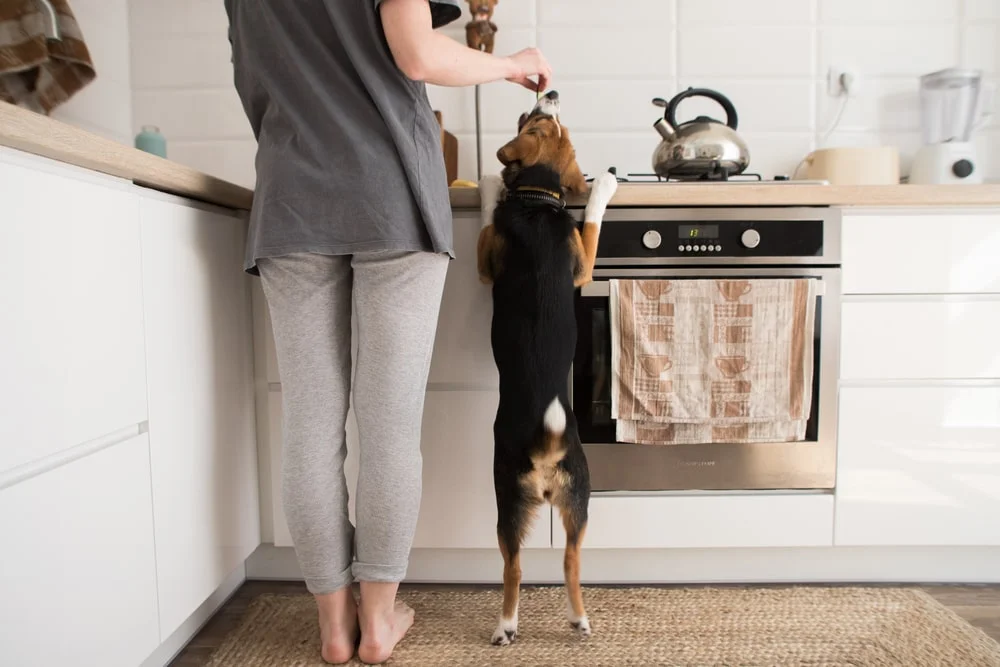PET CARE
We know you want to keep your pup happy and healthy, and one way to do that is by cooking them homemade dog food that meets their nutritional needs. After all, who doesn’t love a home-cooked meal?
Homemade dog food recipes don't have to be complicated either. The whole, fresh ingredients in homemade diets have helped some dogs experience improved skin and fur conditions as well as given them more energy.1 Here are seven different foods to cook for dogs, and tips on how to prepare them.
Keep your dog healthy with the help of MetLife Pet Insurance

Chicken
Cooked chicken is a good source of protein for dogs. Choose skinless chicken breast, and cook it without seasonings. To create a more balanced meal, give your dog chicken with a healthy grain, like rice, and a dog-safe veggie, like green beans.2
Always take the chicken off the bone to prevent your pup from ingesting chicken bones, and be aware that some dogs are allergic to chicken.2
Turkey
Lean turkey is a safe food to cook for homemade dog food. Like chicken, turkey provides a lot of protein and is an ingredient in many kinds of dog food. Make sure there’s no skin or extra fat on the meat, and cook it without seasonings. Then, like chicken, you can mix it with rice or another dog-safe whole grain and veggies if you want to.3
Eggs
Cooked eggs are a safe, healthy food with lots of protein. Feeding your dog eggs is a delicious option every once in a while, and might even be something they can stomach if they’re having digestive issues.3
But before you make a bunch of scrambled eggs for them, one egg a day is what’s recommended — and again, skip the seasonings. If your dog has conditions such as diabetes or pancreatitis, check with your vet first about whether eggs are safe.4
Vegetables
Veggies aren’t just good for us humans. Several vegetables are also safe for dogs to consume — whether raw or cooked — such as:3,5
● Broccoli
● Brussel sprouts
● Carrots
● Celery
● Green beans
● Peas
● Spinach
Vegetables that aren’t safe for dogs include:3
● Asparagus
● Garlic
● Mushrooms
● Onions
As with any human foods you feed your dog, make sure to ask your vet for recommended serving amounts. If you’re worried about your dog choking on or having digestive problems with raw pieces, cooking them can help. Just remember, no seasonings.5
Fruits
While fresh fruits aren’t a dish you need to cook, they’re a great source of vitamins, antioxidants, and other nutrients. Grapes, avocados, cherries, and tomatoes are toxic to dogs and should be avoided. But dogs can safely eat many other fruits, including:5
● Apples
● Bananas
● Berries (like blackberries, blueberries, cranberries, raspberries, and strawberries)
● Cantaloupe
● Mangos
● Oranges
● Peaches
● Pears
● Pineapple
There are a couple of things to be mindful of when giving your dog fruit. Don’t let your dog eat seeds, peels, pits, or rinds. Also, small amounts of fruit are better, since the high sugar content could cause health issues.5 Ask your vet how much you can give your pup for a tasty and safe snack.
Potatoes
Dogs can have most potatoes safely, including sweet potatoes. They’re a good source of vitamins, carbohydrates, and fiber.6
Boil, mash, or bake them — but skip the seasonings and toppings you might put on your own. Ingredients like cinnamon, milk, and garlic can be irritating or toxic to dogs.3 It’s also a good idea to remove the skins before your pup chows down since they can be hard for them to digest.6
Fish
Salmon, sardines, and white fish are all good options to cook for homemade dog food. They’re high in good fats and a healthy protein alternative to meats like poultry or beef. It’s not a good idea to feed your dog raw fish. Cook it without seasonings and make sure to remove all of the bones.3
Yogurt
Consuming dairy regularly isn’t usually recommended for dogs, but most can safely consume small portions of plain yogurt, without added sugars or artificial sweeteners, on occasion. Other dogs, however, are lactose intolerant so it can be best to avoid yogurt.3
Probiotics can help keep your dog’s digestive system healthy and working well, and yogurt is a great supplier of them.3 Add a scoop of yogurt to the top of their food, or use it in a dog treat recipe.
Keep Your Pup Healthy and Safe
There are lots of human foods that can be safely added to your dog’s diet as a treat or as part of their entire meal. But it’s important to make sure you’re following vet-approved homemade dog food recipes so your pup is getting all of the essential nutrients they need. You might have to make adjustments, too, depending on any allergies or sensitivities.
Looking for more ways to prioritize your dog’s health beyond homemade dog food? A dog insurance policy from MetLife Pet can help you cover unexpected vet bills, like when they eat something they shouldn’t. Our optional Preventive Care plan can also reimburse you for routine vet expenses that help keep your pup in good health!7 Get a free, personalized quote today.
Dr. Hunter Finn has been paid by MetLife to discuss the importance of choosing pet insurance. He is an integrative veterinary expert first, and social media star second. America’s favorite veterinarian owns Pet Method in McKinney, Texas, where he cares for pets while prioritizing their emotional well-being. When he’s not at his clinic, he’s starring in viral videos on TikTok (2 million followers) and Instagram (500K followers) — where he’s been known to snuggle puppies and conquer the latest dance trends.
MetLife Pet’s dog insurance can help you cover vet bills
Explore our customization options



